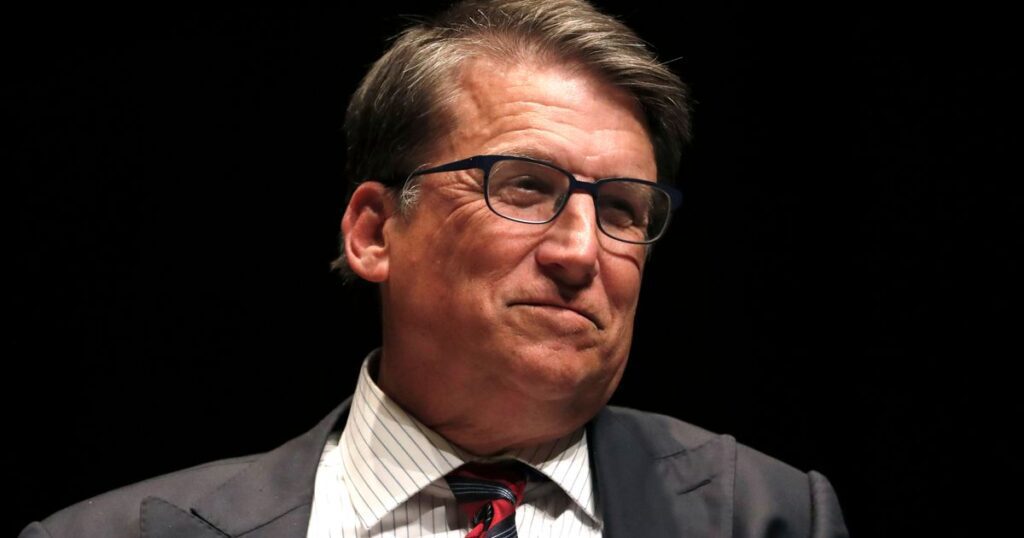RALEIGH, N.C. (AP) – North Carolina's Supreme Court has ruled on a special legal ruling that would allow election officials to denigrate individual voters and set precedent on how to pursue claims of voter fraud. May determine whether you hold privileges.
The North Carolina Supreme Court is scheduled to hear oral arguments Thursday morning in Bouvier v. Porter, a case that has been pending in state court for the past seven years. The lawsuit centers on four voters in Guilford and Brunswick counties who claim they were defamed by supporters of former Republican Gov. Pat McCrory in the aftermath of the 2016 election.
In the 2016 gubernatorial election, Democratic Gov. Roy Cooper defeated McCrory by a margin of 10,277 votes. McCrory supporters then filed an election protest petition declaring there was voting fraud, including accusations by Greensboro Republican Party official William Porter.
Four people are accused of voting twice in Guilford County during election protests, according to the plaintiffs' 2017 lawsuit. Porter's petition to three Guilford voters was dismissed for “lack of evidence presented,” and one Brunswick County protest was dismissed, according to the appellate court's opinion.
The plaintiffs claim they were defamed by Porter's petition and are seeking $25,000 in damages, according to the complaint.
One of the plaintiffs' lawyers said it was unclear whether the case would be decided before the 2024 election.
An amended complaint later that year named more defendants, including the law firm Holzman Vogel Josefiak Torchinski and the Pat McCrory Committee Legal Defense Fund. Another Brunswick County plaintiff was added to the case after one of the original voters voluntarily left the case, according to the amended complaint.
But the case before the North Carolina Supreme Court does not determine whether the allegations defamed voters. Instead, it focuses on whether the defendant had a type of immunity known as absolute privilege to make those claims.
Absolute privilege is a legal term used in defamation lawsuits to outline the circumstances in which someone is exempt from liability for potentially defamatory statements. This privilege is typically granted in judicial and legislative proceedings.
The North Carolina Court of Appeals granted the plaintiffs a partial victory in 2021, ruling that McCrory's law fund and law firm did not have absolute privilege. But they ruled that Porter was privileged because he operated within a “quasi-judicial election protest process.”
But the defendants are arguing before the state Supreme Court that everyone should be granted immunity. By not giving absolute privilege to all involved, the brief says, it prevents those interested in the election from speaking out “freely and without fear.”
Bob Hunter, an attorney with the Pat McCrory Committee Legal Defense Fund, declined a request for comment from The Associated Press.
Jeff Loperfido, plaintiffs' attorney and chief counsel for the Southern Social Justice Coalition, said the defendants “ghost-wrote” the petitions for others to sign, acting in a position that confers absolute privilege. He said that he had not done so. He said if the North Carolina Supreme Court sides with the defendants, allegations of voter fraud could be used to deter voters or sow distrust in the state's election system.
“This is really about the fundamental right to vote, and it's important to note that individuals who are North Carolinians can be used as political pawns in this way, with no consequences,” said Loperfido, who joined the lawsuit in 2018. “It's about whether you can have your name tarnished without doing anything.”
A lot has changed since the appellate court's decision. Loperfido said one of the plaintiffs, Karen Niehans, died in early 2023, so her defamation suit was dismissed. The remaining plaintiffs are said to be retired employees.
Since the appeal decision, the North Carolina Supreme Court has been made up of five Republicans and two Democrats, both of whom served as plaintiffs' attorneys but were forced to resign.
But the panel, which is made up of all Republican judges, is not interested in Mr. Loperfido because he considers the case to be nonpartisan.
“This is a failure of a defeated candidate's campaign to try to create enough smoke to delay certification or to encourage the State Board of Elections to review these protests in a certain way. “It's possible,” he said.
Both parties are currently awaiting a verdict after the conclusion of oral arguments. Loperfido said that could take about six months, depending on whether the court wants to issue an opinion after the 2024 election.

